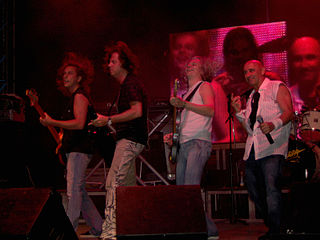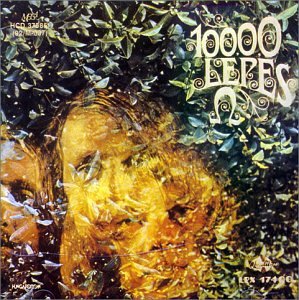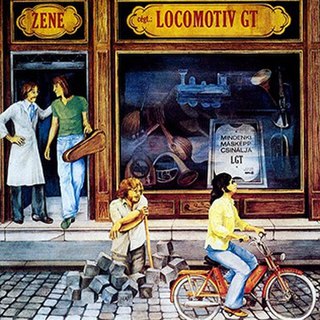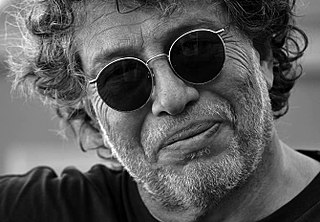
Omega is a Hungarian rock band formed in 1962. They have released more than 20 albums in both Hungarian and English, and their current lineup has been intact since 1971.

Beatrice is a Hungarian rock band. It was founded in 1969 as a women's band, who played mostly cover songs. In 1971, Nagy Feró joined the band as a frontman. In the following years, the membership was completely replaced, and from 1974 they began to write their own songs in the then fashionable glam rock style. They were constantly trying to reach a record deal, and from 1976 onwards they were oriented towards disco music.

Hungarian rock has been a part of the popular music of Hungary since the early 1960s. The first major bands were Illés, Metró and Omega. At the time, rock was not approved of by the Hungarian Communist authorities. In the 1970s, the Communists cracked down on rock, and Illés was banned from recording. Some members of the other bands formed a supergroup called Locomotiv GT, while the band Omega became very popular in Germany.

Zorán Sztevanovity is a Hungarian pop guitarist, singer and composer.

Locomotiv GT was a Hungarian progressive rock band formed in 1971. During their heyday they were one of Hungary's most popular rock bands. The band broke up in 2016 after the death of longtime singer/bassist Tamás Somló.

Compared to other Hungarian music albums of the time, the sound of Locomotiv GT was heavier, and with the exception of "Ezüst nyár", the album lacked so-called hits. That was the result of a conscious decision made by the group; they intended to play high-quality rock music resembling more to that of made by English and American groups. Unlike albums released by LGT in the second half of the 1970s, the instrumentation of Locomotiv GT is somewhat simple, the saxophone being the only "exotic" instrument. The music is built around the virtuoso guitar playing of Barta, and the masterful organ playing of Presser; in addition, Frenreisz plays his bass more powerfully than most of his Hungarian peers, and the drumming of Laux is also worth to mention. The style of the songs does not really fit in with the typical Hungarian pop music of the time; that is, it is more mature, although it cannot be called progressive rock in its traditional sense. Improvisation, showing the skills of the musicians, was employed more frequently in songs, such as "A Napba öltözött lány", "A tengelykezű félember", and "Hej, én szólok hozzád". The influence of American blues-rock and jazz are also evident. Locomotiv GT recorded the album before they played any live concerts together. Gábor Presser later stated that the album was a getting to know each other affair, and that LGT became a real band only by the time they recorded their following album, Ringasd el magad. The lyrics were written by Anna Adamis, who provided the lyrics to most Omega songs between 1968 and 1970.

10 000 lépés was the second album of the Hungarian band Omega. It was released in 1969.

In 1972 Ringasd el magad, the second album of Hungarian rock group Locomotiv GT was released. Its instrumentation was worked out and rehearsed in Budapest, the album was recorded at MHV Studios also in the Hungarian capital, whereas the running order was put together by the band at a restaurant on Oxford Street, London. Although the style of the band was basically the same, the sound and stylistic diversity of the songs show a considerable progress. While on Locomotiv GT they used electric instruments almost exclusively, the instrumentation of Ringasd el magad is much more complex.

Bummm! is Hungarian rock band Locomotiv GT's third studio album and was released in 1973. It was their first album with singer and bassist Tamás Somló and their last album with guitarist Tamás Barta before he left the band. Because Somló was only learning the bass guitar when he joined the band, most of the bass on the album was recorded by Barta. The album was recorded and released in 1973. Not long after its release, the album was banned due to Barta's immigration to the USA, which was illegal at the time. The album was re-released in 1982 but without its original cover.

Mindig Magasabbra is the fourth studio album by Hungarian rock band Locomotiv GT, released in 1975. It was their first album with János Karácsony.
Ghymes is a band, consisting of Hungarians living in Slovakia, founded at the University of Education in Nitra in 1984, by musicians with different preliminary musical experiences from classical through rock and Renaissance music. Folk elements have gradually clung together with their own individual musical ideas.

Locomotiv GT V. is the fifth studio album by Hungarian rock band Locomotiv GT. It is the band's first double album, which was released in 1976 and was the last LGT album with drummer József Laux and the last featuring lyricist Anna Adamis. The album was banned due to Laux' immigration to the United States, which was illegal at the time.

Zene — Mindenki másképp csinálja is the sixth studio album by Hungarian rock band Locomotiv GT, released in 1977. It was the first LGT album with new drummer János Solti and lyricist Dusán Sztevánovity.

Éjszakai országút is the third album of the Hungarian rock band Omega, released in 1970. It was the last band album with the keyboardist/vocalist Gábor Presser and drummer József Laux, which later created Locomotiv GT, more jazz-oriented band.
Thy Catafalque is an avant-garde metal band formed in Makó, Hungary, later based in Edinburgh, Scotland, after the relocation of its founder.
An Imaginary Report on an American Rock Festival is a Hungarian musical by composer Gábor Presser, lyricist Anna Adamis and book writer Sándor Pós based on the short novel of the same name by Tibor Déry. The musical premiered in 1973, and being the first successful Hungarian rock musical opened the way for popular music to Hungarian theatres and literature. It is set in a U.S. rock festival and tells a story of a married Hungarian immigrant couple.
Hungarian pop is the pop music scene of Hungary. It is often associated with Rezső Seress's song "Gloomy Sunday" which was covered by numerous artists. The most notable artists include Kati Kovács, Zsuzsa Koncz, Judith Szűcs, Locomotiv GT, Omega, Neoton Família, Karthago, Jimmy Zámbó. Among the new talents are Kállay Saunders and Linda Király.

Károly Frenreisz (born 8 November 1946, Budapest, Hungary) is a Hungarian rock singer and songwriter.

Tamás Somló was a Hungarian musician, singer-songwriter and artist. He is mostly known for having been a member of Hungarian rock bands Omega and Locomotiv GT and for composing several of their successful songs. Beside of being a singer, his main instruments were bass guitar, clarinet, and the saxophone.

Gábor Presser is a Kossuth Prize winner and a Hungarian musician, composer, singer. He is member in Locomotiv GT and was member in Omega, a prominent personality of the Hungarian pop music.















